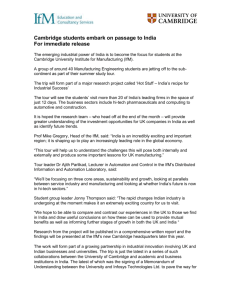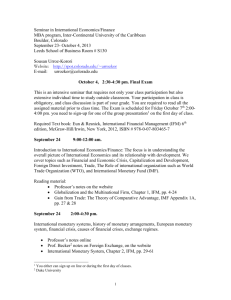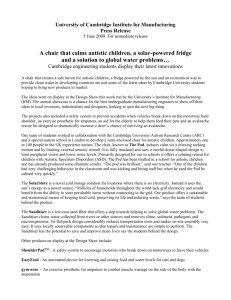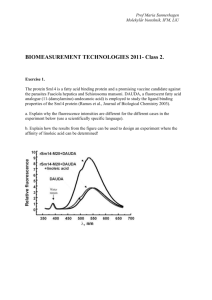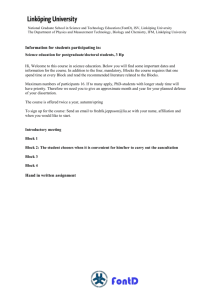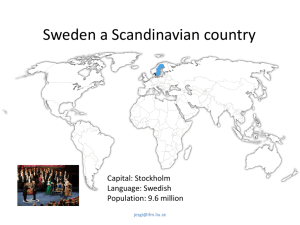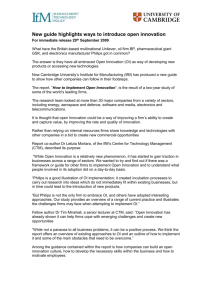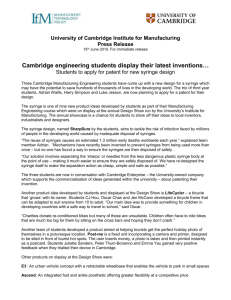Delivering growth through effective innovation and technology
advertisement
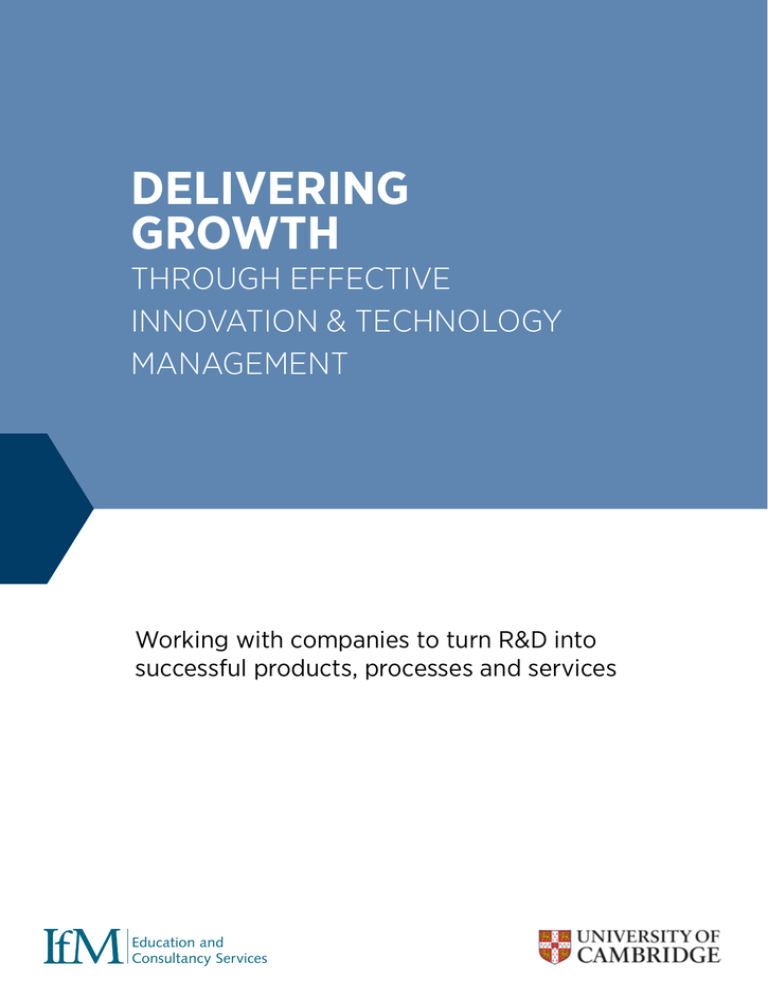
DELIVERING GROWTH THROUGH EFFECTIVE INNOVATION & TECHNOLOGY MANAGEMENT Working with companies to turn R&D into successful products, processes and services Education and Consultancy Services About us Institute for Manufacturing (IfM) The IfM is part of the University of Cambridge. It is a major centre of research and education for innovation and technology management. IfM Education and Consultancy Services (IfM ECS) IfM ECS provides consultancy and executive education based on the new ideas and approaches developed at the IfM to help manufacturing and technology-intensive companies around the world create and capture value more effectively. How we can work with you Consultancy We have a team of practitioners, all with strong academic credentials, extensive industrial experience at a senior level and a commitment to bringing research to bear on real industrial challenges and learning from the results. They can support your innovation and technology management activities and help you to develop your own – and your organisation’s – capabilities. We aim to share our knowledge with you through a distinctive, collaborative approach to consultancy as well as through education programmes and publications, so that you can continue to apply our methods yourself. Customised education programmes We create bespoke education programmes for large companies which give individuals the knowledge and skills they need to develop and put in place successful innovation and technology strategies and systems. Forums Open courses We run courses and workshops throughout the year covering a range of technology and innovation management themes, including: Strategic roadmapping Technology and innovation management Visual approaches for strategy and innovation management Technology intelligence Valuing and selecting technology projects IfM also runs a number of forums which bring together a range of (non-competing) companies and IfM researchers to share new research and develop best practice. The Strategic Innovation and Technology Management (STIM) consortium, for example, is a research and networking collaboration between industrial member companies and the Centre for Technology Management. We also support open innovation in the Food and FMCG sectors. The Food and FMCG Open Innovation Forum has been running successfully since 2010, bringing together open innovation practitioners from leading companies such as Mars, PepsiCo, Tesco and Unilever to develop their open innovation strategies and capabilities and learn from one another. Briefing days For companies wanting to find out about the latest research into new technologies from across the University of Cambridge, IfM ECS can organise and facilitate briefing days at which researchers from a wide range of disciplines present their work. Make or buy Publications Realising the potential of early stage technologies IfM ECS produces a range of publications designed to transfer knowledge and insights emerging from the innovation and technology management research carried out at the IfM. 2 Achieving sustainable growth through innovation and technology management To find out more about IfM ECS, our consultancy, executive and professional education programmes and our publications, go to: www.ifm.eng.ac.uk/services Or contact: Peter Templeton email: pwt23@cam.ac.uk Developing new products, services and processes is vital to profitable – and sustainable – growth. And these tasks are now more urgent and more taxing then ever before. The companies we work with face an array of external and internal challenges: globalisation, new and more agile competitors, demands for faster rates of innovation to realise market potential, the sheer pace of change in many areas of new technology, and the greater costs of development as technology advances and systems become more complex. Companies face a variety of innovation and technology challenges. For example, how do you: Against this background of change and uncertainty, companies need to develop an innovation and technology strategy and system which support their business objectives and enable them to develop the new products, services and processes that will secure their long-term futures. In today’s dynamic business environment, this is not a one-off exercise as companies respond to changing circumstances by creating new business models and strategies to which their innovation and technology activities must adapt. And none of this is possible without people who have the knowledge, skills and motivation to create and manage these systems and who are supported in their efforts by a positive company culture. Maintain a healthy innovation pipeline How we can help IfM ECS has a portfolio of flexible yet coherent innovation and technology management approaches and techniques which we customise to address your company’s needs. Developed by University of Cambridge researchers and put into practice by our team of experienced consultants, these approaches have robust theoretical underpinnings and have been extensively tested through practical application. The flexibility and scalability of our methods are key: they can be used together to provide a total innovation and technology management development programme or they can be used selectively to meet an organisation’s particular challenges. We work with manufacturing and technology-intensive companies to develop their capabilities across the three core elements of innovation and technology management: the strategy, the system and the people and organisation. We can also help when any or all of these elements need to respond to fundamental changes in the business context, strategy and model. What is different about IfM ECS and the way we work? Make sure that R&D is doing what the business needs it to do Strike the right balance between risk and opportunity Back the right technologies Identify synergies across the business Form successful partnerships with organisations such as universities and start-ups Design products, processes and services which really meet customers’ needs Equip people with the right knowledge, skills and attitudes Reorganise your R&D to support new business structures, such as moving from regional to global business units? Everything we do is based on research from one of the world’s leading universities. We use collaborative processes to develop strategies and action plans which gain buy-in and communicate the results throughout the organisation and beyond. We share our tools and techniques with you so you can continue to use them after the project has finished. We have worked with hundreds of organisations around the world, including companies such as BAE Systems, BP, GKN, the Linde Group, Philips, Rexam and Rolls-Royce, helping them develop and put in place successful innovation and technology management strategies and systems. 3 Defining the strategy Why? To ensure that your innovation and technology strategy supports your business objectives and efficiently brings the ‘right’ technologies to market. How? Consultancy based on IfM research and delivered mostly though structured workshops to engage key stakeholders from across (and sometimes beyond) the organisation, supported by desk research and analysis where appropriate. A company’s innovation and technology strategy should support its business objectives. There are, however, many reasons why this proves challenging in practice, not least that the business strategy itself is something of a moving target as it responds to a rapidly changing external environment and technology landscape. A good innovation and technology strategy ensures that the company focuses its R&D resources on the ‘right’ markets and products – and their underpinning technologies – in order to achieve the business’s overall objectives. But this is a complex task when there are so many factors affecting strategy development. We use a range of structured approaches to help you capture and understand the data you need to make sound strategic decisions. We can help you: Understand the complex and often dynamic external context and drivers, including the market and technology landscapes Interpret the business strategy and translate it into innovation and technology objectives, identifying which Product Market Groups should be prioritised In large companies with multiple business units, develop coherent strategies across units and identify potential areas of overlap and synergy Understand the company’s (and its partners’) innovation and technology competences and capabilities and where its strengths and weaknesses lie Consider a range of strategic options and assess how well-equipped the current innovation system is to deliver them Develop business cases for each of the options in order to evaluate and select the most promising opportunities Communicate the strategy clearly to all stakeholders to get buy-in Decide how the strategy will be implemented and measured. Research-based techniques Context and drivers People and organisation Business strategy Innovation and technology strategy Innovation and technology system Identification Selection Protection Intellectual property Acquisition Exploitation 4 Our approaches are based on research carried out at the IfM. One key focus of this research is roadmapping, a powerful technique for capturing and making sense of the huge amounts of connected data needed to inform effective decision-making. The roadmapping methods can be readily adapted to different needs and contexts, ranging from the overarching business and innovation strategies to planning for individual products, services or technologies. Roadmapping can also be used in conjunction with a wide range of other IfM tools and techniques at both the strategy and system level. Communicating the innovation and technology strategy However well planned and executed a technology strategy, it can still fail if it is not clearly communicated to managers and stakeholders across the company and to customers and external partners. But communicating this kind of highly complex and interconnected information is not easy. Developing effective visual outputs is a significant focus of IfM research and we can use this new thinking to communicate the strategy, gain support for it and overcome barriers to successful innovation. Case study 1: developing a global technology roadmap A packaging company enlisted lfM ECS’s help to implement an initiative to coordinate its global technology plans and investments. We led an initial roadmapping workshop with senior leaders and experts from across the European business and then supported a knowledge transfer project to enable the company to deliver parallel workshops in North and South America. The roadmaps were then consolidated to identify common programmes that would yield the maximum synergy for the group. We have also supported the company in rolling out plans for the resulting strategy and in building a visualisation of the top-level roadmap for communication with employees, shareholders, customers and suppliers. Case study 2: establishing an annual strategy and system review process IfM ECS helped an international car manufacturer to introduce an annual innovation strategy development and implementation process which linked its new product introduction process to its business strategy. The process started with structured workshops to understand the external environment and to develop a technology strategy and a roadmap to plan progress from the ‘current’ state to the ‘desired’ state. We transferred knowledge of all the methods to the client so they can repeat this process on an annual basis. Case study 3: aligning technology management with business strategy IfM ECS worked with an oil and gas company to introduce a roadmapping process to help it link its business units to its technology function more efficiently and to identify cross-cutting opportunities. “The technology roadmap activity is the foundation from which we will develop an explicit technology strategy going forwards and clear global technology areas of focus.” Director of Technology, Packaging “The project has enabled us to develop a framework to introduce new model concepts into the market in a more efficient and coordinated way. It ensures that we take account of all the future external factors and link them to our existing and developing capabilities in order to deliver these new models to our customers.” Head of Research Department, Automotive We provided pilot workshops and training as well as business-focused workshops and complete knowledge transfer of all the methods needed to support this process. “While roadmapping has proved to be a powerful and flexible technique for strategic planning and innovation, a principal benefit is the communication it has engendered, both during the development of the roadmap and afterwards. The ‘hands-on’ nature of the workshop-based process is a key feature, where the group is responsible for building a common visual representation of their strategic context, issues, goals and plans. Roadmaps can be used as a common reference point and language to support the ongoing dialogue that is essential for effective innovation and strategy development and implementation.” Director of Corporate Strategy, Engineering 5 Building the system Why? To develop a system which can deliver new and better products, services and processes with shorter lead times and more efficient use of resources. How? Consultancy through structured workshops using a range of researchbased methods. To put their innovation and technology strategy into practice, companies need to build a system which will deliver the ‘right’ products, processes and services, which makes good use of its R&D resources to achieve maximum return on investment and which, crucially, is able to respond to the changing external context and the company’s business priorities. IfM ECS’s framework for building a robust and responsive innovation and technology management system is based around five key processes: technology Identification, Selection, Acquisition, Exploitation and Protection (ISAEP). We have a set of research-based methods to help you define your objectives and address your capabilities in these areas. Identifying technologies: Our approaches help you improve your mechanisms for finding, capturing and communicating information about technologies (both internal and external) which may affect your product development and production processes, and identifying which represent opportunities and which, threats. Selecting technologies: We have a set of approaches to help you determine your portfolio of products and services and the associated production process technologies, plan for external acquisition, evaluate emerging technologies and consider an increasingly important selection criterion – the impact your choice of technologies will have on resource and environmental sustainability. Acquiring technologies: Technologies can be acquired in a number of ways: internal development, external acquisition or co-development with partners. Strategies such as ‘Make-Buy-Alliance’ and Open Innovation help companies develop their own product and/or process technologies where appropriate, and improve their skills in acquiring technologies from third parties. Exploiting technologies: Technologies need to be effectively exploited if they are to deliver long-term growth. It can also be the case that new technologies might themselves lead to previously unforeseen product or market opportunities and could potentially change the business strategy. We have a range of approaches that help understand and define market and customer needs, design the new products and services that best address them and specify the processes to deliver them. We support the design process to achieve product performance and timely delivery and address such considerations as reducing resource and environmental costs and impacts, ease of assembly, user inclusivity and ergonomics. Context and drivers People and organisation Business strategy Innovation and technology strategy Protecting technologies: The effective protection of early stage technologies is an important part of the technology system. IfM expertise in this area focuses on understanding the most appropriate approach to take to IP whether it is sole ownership (and establishing the measures you need to protect it), sharing IP with technology partners or opting for Open IP. Innovation and technology system How we can help Identification Selection Protection Intellectual property Acquisition Exploitation 6 We can work with you on any of these aspects of your innovation and technology system or we can review the system as a whole using a structured assessment tool. This involves an assessment of your innovation and technology strategy and how well it aligns with your business needs, the innovation system spanning ‘ISAEP’, and your people and organisation. By identifying targeted opportunities for development, this process can help improve your innovation performance and its contribution to profitable and sustainable business growth. Case study 1: building a system to identify technologies IfM ECS worked with a global technology company to carry out a review of its technology intelligence (TI) capabilities. We looked at the organisation’s effectiveness at turning data into valuable intelligence which could effectively inform a decision-making process; at understanding, defining and communicating the value of good technology intelligence; and at increasing new business opportunities and reducing risk by developing a more effective, cross-company scanning process. We made a number of recommendations, such as creating a TI ‘task force’, embracing an Open Innovation culture and putting in place better processes and performance measurements. Case study 2: selecting technologies IfM ECS carried out a portfolio roadmapping project with a global manufacturer. Following an initial landscaping workshop, a large number of potential projects, both long and short-term, were identified and needed to be prioritised. A group of technologists within the company took part in a number of iterative brainstorming sessions to refine the thinking and select the projects going forward by looking at the scale of opportunity against the level of feasibility. Filters were then applied to the chosen projects to ensure that the company achieved a balanced portfolio across their Product Market Groups and that they were aligned with the company’s strategic vision. “Adopting IfM’s make-orbuy analysis approach has helped us to closely define the key process technologies that support our competitive differentiation and that we wish to nurture inhouse. Just as important has been understanding how to develop winwin relationships with strategic partners who provide complementary technologies, and treating those differently from the more transaction-based supply relationships. Overall, this helps us to focus investment and effort into the critical areas, and thereby maximise returns.” Chief Operating Officer, Construction Vehicles Case study 3: acquiring technologies IfM ECS has recently worked with a white goods manufacturer to apply its make-or-buy tools as part of a long-term manufacturing footprint strategy project. The tools have been applied at two levels. The first level assessed the key manufacturing processes to identify the right level of factory vertical integration. The second level assessed the major product categories to identify which should be made in-house, and which should be outsourced. Products to be outsourced were further analysed using a risk analysis tool to assess competitive risks and potential impact on ongoing innovation, leading to more nuanced outcomes such as strategic alliances, joint ventures and ‘make some’ approaches. Case study 4: exploiting technologies IfM ECS worked with a mid-sized company based in the UK and India looking at ways in which it could improve its complex and labourintensive production processes to bring its products to market more quickly and efficiently. This ongoing collaboration has used a number of IfM ECS methods, initially to define and prioritise the issues that need addressing and then, using ‘Design for Manufacturing and Assembly’, to achieve some ‘quick wins’ by redesigning products and improving sub-assembly processes. A structured diagnostic tool delivered using a web-based platform was subsequently used to collect large quantities of data from both within the company and from its suppliers and customers to understand the strengths and weaknesses in the company’s technology system, to avoid bottlenecks, reallocate resources to ease constraints in key areas and make gains in capacity. The project also looked at issues relating to people and organisation such as developing management capabilities and looking outside the business for expertise in key areas. “Working with people from Cambridge University has undoubtedly brought a fresh and creative perspective to our product development approach. Often if you engage a large consultancy firm, you can risk engaging multiple consultants and a not inconsiderable bill. Businesses sometimes need a lighter touch and a guiding hand in the right direction. IfM ECS is a real ambassador for such an approach and is a credit to the University.” Head of Centre of Excellence, Gas and Engineering 7 Developing successful people and organisations Why? To ensure that companies have the right people, expertise and culture to make good innovation and technology decisions. How? Customised and open education programmes; consultancy through structured workshops, supplemented by desk research and benchmarking. Strategies and systems are only as good as the people who design and implement them. Companies need a combination of clear and effective leadership and people with the right expertise and motivation to put the strategy into practice and who are able to thrive in a dynamic and uncertain environment. An organisation’s culture – ‘how we do things around here’ – is also important in this context. It should help create the conditions in which innovation can flourish but, in practice, it can sometimes prove a barrier to success. By understanding how your culture affects your innovation and technology strategy and system you can put in place mechanisms to mitigate any difficulties it may cause. Developing new leaders through executive and professional education IfM ECS creates bespoke education programmes to develop management and leadership talent. These are for people who are expected to play a significant role in shaping their organisations’ futures. To do so, they need to be proactive decision-makers, work collaboratively with colleagues from other disciplines using a common technical language, exert their influence by developing organisational networks and use their knowledge effectively in complex, global and dynamic environments. We use a structured process to customise our programmes, working closely with the company to understand its objectives and then designing a programme which delivers demonstrable results. Delegates gain access to the latest thinking from the University of Cambridge in a wide range of technology management areas and our interactive teaching practice gives them skills and tools that are immediately applicable in the workplace. Strategic workforce planning Context and drivers People and organisation Business strategy Innovation and technology strategy Innovation and technology system Identification Selection Protection Intellectual property Acquisition Exploitation 8 All companies need good people. For companies that depend on technology, having people with the right skills and qualifications – particularly in science, technology, engineering and maths – is critical. IfM ECS can work with you to define a long-range strategic plan that will help you recruit, develop and retain the highly skilled and adaptable workforce you need to remain competitive in a global market. We do this by using a version of roadmapping which has been adapted to focus on workforce development as part of the strategic planning process. Organising for innovation IfM research into a number of topics relating to people and organisations can also be used by IfM ECS to help companies develop their capabilities. These topics include: the role of the CTO, in particular, and technology leadership more generally; managing the chaotic early stages of innovation; how established companies can create the conditions in which innovation can thrive; and how to develop successful partnerships with other companies. Case study 1: developing new leaders IfM ECS has created a bespoke education programme for an international information technology services company. It aims to help its high performing technologists and functional specialists across the company become expert business technologists who will be able to make important contributions to new technology and business strategies across a very diverse client and technology portfolio. Case study 2: management development IfM ECS ran a major programme for a company which manufactures equipment for construction and power systems. This programme formed a key element in an integrated management development initiative in which IfM ECS worked with leading universities in Asia and the USA. Managers took modules in economics, finance, marketing and innovation, leadership and strategy at the IfM. “I really feel as though I’m leaving [the course] with some methods and tools that can impact my business. I also have gained an insight into what’s out there and how to manage it in the world of technology.” Senior Executive, Defence “Delivered by practitioners with great depth of knowledge.” Group Technology Officer, Automotive Case study 3: in-company technology and innovation management programme We provided customised in-company training to help managers in a multinational energy company understand and use the key tools and techniques needed to manage and exploit technology investments and opportunities in the context of their own company and industry. They learnt how to integrate technological considerations into business strategy and long-range planning processes, how to understand which products and components to make in-house and which to outsource (and to deal with the associated collaboration issues) and how to manage new product development and introduction processes in the context of the innovation system. Case study 4: strategic workforce planning In 2010 BAE Systems launched a comprehensive skills and education programme to address its current and future workforce needs. IfM ECS carried out more than 50 structured interviews with BAE Systems staff and consultation with other key UK organisations including the Ministry of Defence, BP, GKN, GSK and Rolls-Royce. This information was then used to inform a roadmapping workshop attended by senior leaders from across BAE Systems. The resulting roadmap formed the basis of the company’s ‘Skills 2020’ strategy, launched in 2010. Since then we have used a tailored version of the roadmapping approach to support the introduction of strategic workforce planning within BAE Systems, refreshed the benchmarking exercise with other companies and helped to develop a coherent approach to strategic workforce planning that can be rolled out across BAE Systems’ business units. “Skills 2020 is a co-ordinated skills and education programme which touches every part of our UK business and on which we spend £79 million annually. The findings from IfM ECS‘s strategic roadmapping exercise directly informed our strategy for attracting, developing and retaining the flexible and customeroriented workforce that we and other UK manufacturers need in this critically important decade.” Education Director & Head of Early Career Programmes, BAE Systems 9 Responding to change Why? How effectively an innovation and technology strategy and system can respond to business change is often a decisive factor in a firm’s long-term survival. How? Research-based consultancy and executive development; in the Food and FMCG sector, the opportunity to join the Open Innovation Forum and share best practice with other leading companies. Innovation and technology strategies and systems need to respond quickly to changes in the external environment and the company’s business strategy. Switching to a service-based business model Many manufacturers and technology-intensive companies are developing a service element to their business to generate new revenue streams and get closer to their customers. Working with researchers at the Cambridge Service Alliance and the Centre for International Manufacturing at the IfM, we have developed a set of approaches to help companies understand: The service ‘ecosystem’ they are operating in to identify new opportunities to capture value The technological requirements of the service-based business model, and how they can be met How key resources, such as engineering, should be developed to support complex service systems How multi-partner consortia should design their proposals and projects to deliver large government and defence programmes. Extracting value from mergers and acquisitions Mergers and acquisitions (M&As) are often used to grow or restructure a business rapidly. However, research has shown that inadequate assessment of the need for, and then the management of, the integration process means that M&As often fail to deliver the anticipated benefits. We can help companies overcome barriers to post-merger change through an objective process that brings stakeholders together to: Understand the post-merger business, product, service and process opportunities and strategies to realise value from them Develop a post-merger innovation and technology strategy Integrate and develop their innovation systems Develop and help align people and organisational cultures. Reorganising the business Major reorganisations – moving from regional to global business unit structures, for example – can change the focus and priorities for the company’s innovation strategy and system. Our structured approach helps ensure that the innovation needs and priorities of the new organisation are effectively addressed and that it is able to achieve productive innovation in the shortest possible time. Context and drivers Developing innovation partnerships People and organisation Business strategy Innovation and technology strategy Innovation and technology system Identification Selection Protection Intellectual property Acquisition Exploitation 10 As the pace of technological change accelerates, companies increasingly need external sources of expertise. But forming effective partnerships is often complicated by the asymmetrical nature of the relationship and the different ways in which large and small companies tend to work. Open innovation is a significant area of IfM research, focusing on the culture, procedures, skills and motivation needed to support successful partnerships. IfM ECS can help by taking a structured approach to negotiating these partnerships, using workshops to define the partners’ shared vision and clarify the steps needed to achieve it, identifying the success factors for alliance-based business models and improving both organisations’ understanding of what it takes to achieve successful open innovation. Case study 1: switching to a service-based business model A global leader in aerospace and defence systems wanted to transform its business model from a traditional design-build approach to offer full lifecycle support of its products in the field. The context was particularly challenging as there were zero-failure performance requirements and political pressure for cost reduction. We used a series of workshops and network analysis steps developed by the IfM’s Centre for International Manufacturing to help a senior cross-functional team define the strategic intent for the business and develop a coherent view of how the engineering and service networks should underpin the delivery of full lifecycle support. The next stages looked at how to manage multiple service delivery partners and assigning clear roles for each location resulted in clearer strategic thinking, better performance and the avoidance of duplicated overhead. “The process was designed so that each division would focus on its own strategic development but there were also cross-divisional sessions to ensure that potential synergies were identified and taken up. Innovation opportunities certainly emerged as a result of the crossfertilisation in the process.” Rob Phaal, Institute for Manufacturing Case study 2: extracting value from mergers and acquisitions We worked with the Australian arm of a global defence, aerospace and security company, using the Centre for International Manufacturing’s network analysis and design tools, to support the implementation of an engineering network integration plan for two organisations following a merger. This involved integrating the acquired company’s and ‘parent’ organisation structures and their manufacturing facilities to provide major servicing capability. Case study 3: reorganising the business When one of the UK’s largest manufacturing companies reorganised its R&D function from a single central resource to four separate units serving each of its divisions, it needed to develop a strategic approach which would be consistent and would encourage cross-divisional cooperation and innovation. It also recognised the need to increase its planning horizons from, typically, three to five years to 15 to 20 years. A workshop brought together the top 60 technologists from across the group to develop new roadmaps for each of the business units and to look at related areas of activity that the company could expand into using its existing technology capabilities. The process was managed at the corporate level to ensure consistency and to generate outputs that would inform the whole company’s annual strategy planning and budgeting cycle. Case study 4: open innovation IfM ECS has been running the Open Innovation Forum since 2010, bringing together a group of global brands in the Food and FMCG sectors (including Mars, PepsiCo, Tesco and Unilever) to exchange best practice and identify opportunities to create value through collaborative innovation. It gives open innovation specialists within each company the chance to learn from experienced practitioners, to share their successes and failures and benefit from ongoing IfM research. There is also the opportunity to establish real open innovation collaborations through the Forum’s regular ‘pitching’ events at which SMEs and spin-outs from university departments pitch new business ideas which address the innovation needs of the Forum members. “Here is a real opportunity to create a breakthrough / step change in consumer and community value as we further collaborate with our peers in the industry. The unique feature of this forum is the focus on our industry value streams, and membership from companies representing every stage. This enables discussions on best practice to be more productive, as they are in a shared context. It also means we can explore real innovation needs and opportunities such as sustainability, traceability, health and wellness. These kinds of networks and collaborations enable opportunities that can impact our strategy and innovation efficiency.” External Director Innovation, Food 11 IfM Education and Consultancy Services Institute for Manufacturing Department of Engineering 17 Charles Babbage Road Cambridge CB3 0FS United Kingdom INSTITUTE FOR MANUFACTURING: IfM Photography: The IfM is part of the University of Cambridge. It brings together expertise in management, technology and policy to address the full spectrum of issues which can help industry and governments create sustainable economic growth. p. 4 © Pola Goldberg Oppenhiemer, University of Cambridge Department of Engineering: Polymer pillars fabricated using a lithographic process. IfM EDUCATION & CONSULTANCY SERVICES LIMITED: IfM ECS p. 6 © IfM: Component in the ultrafast laboratory (Centre for Industrial Photonics) IfM ECS works with companies of all sizes to help them create and capture value and with national and regional governments to support and help grow their industrial sectors. It does this by transferring the new ideas and approaches developed by researchers at the IfM through a programme of education and consultancy services. IfM ECS is owned by the University of Cambridge. Its profits are gifted to the University to fund future research activities. p. 8 © IfM: Droplet break-up in a continuous flow (Inkjet Research Centre) p. 10 © IfM: Atomisation patterns produced by the oblique collision of two Newtonian liquid jets (Inkjet Research Centre) IfM research underpinning IfM ECS innovation and technology management services: CENTRE FOR TECHNOLOGY MANAGEMENT (CTM) CTM researches technology and innovation strategies, processes and practices for identifying, selecting, acquiring, exploiting and protecting technology for business benefit. It is one of the world’s leading centres of roadmapping research. DESIGN MANAGEMENT GROUP (DMG) DMG is interested in how design can be effectively managed to create sustainable, desirable, usable and producible new products and services. Key research interests include: new ways of managing product development, how to integrate design and technology and how to design sustainable products and services. CENTRE FOR INTERNATIONAL MANUFACTURING (CIM) CIM researches new approaches to the strategic configuration of global value networks, spanning production, supply, service, engineering and R&D networks. These network design methods have been used with a wide range of companies, often in response to major disruptions resulting from new technologies and innovations, mergers and acquisitions, service and sustainable supply chain developments. CAMBRIDGE SERVICE ALLIANCE (CSA) Working with member companies, such as BAE Systems, Caterpillar, GEA, IBM, Pearson and Zoetis, CSA researches key issues underpinning the generation, development and execution of complex service systems. Key research areas include the innovation of service-based business models, developing service capabilities and the measurement of service systems. CENTRE FOR INDUSTRIAL SUSTAINABILITY (CIS) CIS aims to develop the knowledge and tools that will help accelerate the transition towards a sustainable industrial system. Its concerns inform all aspects of technology and innovation management from creating new business models with different performance characteristics to developing new products and process which have lower environmental impact at every stage of their lifecycle. +44 (0)1223 766141 | ifm-enquiries@eng.cam.ac.uk | www.ifm.eng.cam.ac.uk | Twitter @IfMCambridge
